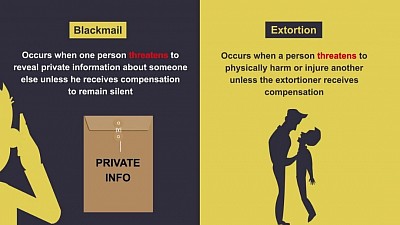Protect Yourself: Insights on Extortion and Blackmail
Key Differences Between Extortion and Blackmail Explained
While both extortion and blackmail involve threats to obtain something of value, the key difference lies in the nature of the threat.
Extortion primarily involves threats of physical harm, property damage, or other direct harm, while blackmail centers on threats to reveal damaging or embarrassing information. Both are serious crimes with legal consequences.
Comprehensive Breakdown of Extortion vs. Blackmail
Extortion:
• Threats: Involves threats of physical harm, property damage, or other direct harm to the victim or their loved ones.
• Coercion: Uses coercion or force to make the victim comply with demands.
• Examples: Demanding money under threat of violence, destroying property unless a demand is met, or threatening to harm someone's family if they don't comply.
Blackmail:
• Threats:
Involves threatening to reveal damaging or embarrassing information about the victim if they don't comply with demands.
• Public Disclosure:
The threat usually revolves around public disclosure of information that could harm the victim's reputation, career, or personal life.
• Examples:
Threatening to release compromising photos, revealing embarrassing secrets, or threatening to report someone's criminal activity to authorities unless they pay money.
Key Distinctions:
• Nature of the Threat: The primary difference is the type of threat used to coerce the victim.
• Immediacy: Extortion often involves a more immediate and direct threat to safety or property than blackmail, which may focus on future consequences of disclosure.
• Legal Ramifications: Both are serious crimes, but the specific laws and penalties may vary by jurisdiction.
In essence, both extortion and blackmail are forms of coercion, but the nature of the threat differentiates them. Extortion relies on direct threats of harm, while blackmail leverages the threat of revealing damaging information.
Understanding Emotional Blackmail: Definition and Impact
Emotional blackmail is a form of manipulation where someone close to you uses fear, obligation, or guilt to get you to do what they want. It involves threats or implied threats that if you don't comply with their demands, they will punish you in some way, often by withdrawing affection, creating drama, or withholding something you need or desire.
Recognizing the Signs of Emotional Blackmail
• Threats:
Explicit or implicit threats to withdraw love, support, or approval if you don't meet their demands.
• Fear, Obligation, and Guilt (FOG):
These are the primary tools used to manipulate. The blackmailer exploits your feelings of loyalty, responsibility, or shame.
• Manipulation:
The goal is to control your behavior by exploiting your emotional vulnerabilities.
• One-sided relationship:
The dynamic is typically unequal, with one person consistently controlling the other.
• Impact on the victim:
Emotional blackmail can lead to feelings of resentment, anxiety, depression, and damaged self-esteem.
Examples of emotional blackmail:
• A parent who says, "If you don't visit me every week, I'll be heartbroken,".
• A friend who says, "If you don't go to that party with me, I'll be so lonely,".
• A romantic partner who says, "If you loved me, you would...", followed by a demand.
Why is it harmful?
Emotional blackmail is a form of abuse because it erodes trust, damages relationships, and can have a significant negative impact on the victim's mental and emotional well-being. Childline says blackmail is a form of abuse and against the law.
What to do if you are being emotionally blackmailed:
• Recognize the pattern: Identify the manipulative tactics being used.
• Set boundaries: Clearly communicate your limits and what you are and are not willing to do.
• Don't engage: Avoid arguing or trying to reason with the blackmailer, as this can reinforce the behavior.
• Seek support: Talk to a trusted friend, family member, or therapist.
• Consider ending the relationship: If the behavior persists despite your efforts, it may be necessary to distance yourself from the blackmailer.


